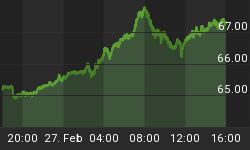At a commercial real estate conference earlier this week, Alan Greenspan downplayed concerns that the Chinese might sell their significant holdings of U.S. Treasuries. The former Fed chairman based his opinion not on the inherent investment merits of Treasuries, but rather on their lack of them. His confidence stems simply from his belief that the Chinese have no one to whom they can sell. Furthermore, Greenspan sees this as a problem for the Chinese and not the U.S.
Although the performance of U.S. Treasuries has long been regarded as poor vis-à-vis other classes of sovereign debt, its overriding virtue has always been its supposed unrivalled "liquidity." As the most heavily traded asset in the world, it is argued that massive investors like the Chinese have few other markets in which they can operate. However, if there are no significant buyers to whom the Chinese can sell, then there is no real liquidity at all. If there is no performance or liquidity, why would they continue buying?
True to form, Greenspan is completely wrong. The Chinese are not the ones who are stuck, Americans are. In order to exit their positions in U.S. Treasuries, the Chinese do not have to sell, they only need to stop buying and let their existing bonds mature. Then the U.S. government, not the Chinese, will be the ones forced to find new buyers for its debt.
Most of the debt that the Chinese own is short-term. Therefore all the Chinese need to do is simply not re-purchase new Treasuries when the U.S. pays them for their existing notes. Perhaps Greenspan should rent a copy of the 1981 Kris Kristofferson movie "Rollover," where the fear that Arab countries would not rollover maturing treasuries sent gold prices soaring.
Of course, even if the Chinese decide to cash out, they will be repaid in dollars, for which they will actually have to find buyers. So while Greenspan's contention does not pertain to Treasuries themselves, it certainly does to the dollars in which they are denominated.
China's foreign exchange reserves are now approaching $1.3 trillion which amounts to $1,000 for every man, woman, and child in China. That figure roughly equates to 60% of China's annual per capita income. A proportional foreign exchange reserve in the U.S. would equate to approximately $20,000 per capita, or $80,000 per household. Can you imagine the political outrage in this country if such a sum was extracted though taxation merely to be left idle as foreign reserves? Could you imaging the demands arising from the rank and file on how the government should return such a sum into the domestic economy? Of course if the Chinese keep buying, which they must do in order to prevent the U.S. economy from collapsing, their foreign reserves will likely eclipse $2 trillion sometime in 2008. That would equate to about $140,000 per American household, almost enough to pay-off the average mortgage! This coming from a country, China, whose per capita income is less than $2,000 and whose government provides virtually no healthcare, education, or retirement benefits.
Greenspan may feel that the Chinese have no choice but to continue this lunacy, but to paraphrase PT Barnum: you can't fool all the Chinese all the time. To expect 1.3 billion hard-working, underpaid Chinese to indefinitely subsidize 300 million wealthy, over-consuming Americans is absurd. To paraphrase Winston Churchill: never have so few owed so much to so many. When the Chinese finally wake up the American dream will disappear. I wonder if Greenspan is loosing any sleep worrying about that!
For a more in depth analysis of the tenuous position of the Americana economy and U.S. dollar denominated investments, read my new book "Crash Proof: How to Profit from the Coming Economic Collapse." Click here to order a copy today.
More importantly make sure to protect your wealth and preserve your purchasing power before it's too late. Discover the best way to buy gold at www.goldyoucanfold.com, download my free research report on the powerful case for investing in foreign equities available at www.researchreportone.com, and subscribe to my free, on-line investment newsletter at http://www.europac.net/newsletter/newsletter.asp.















